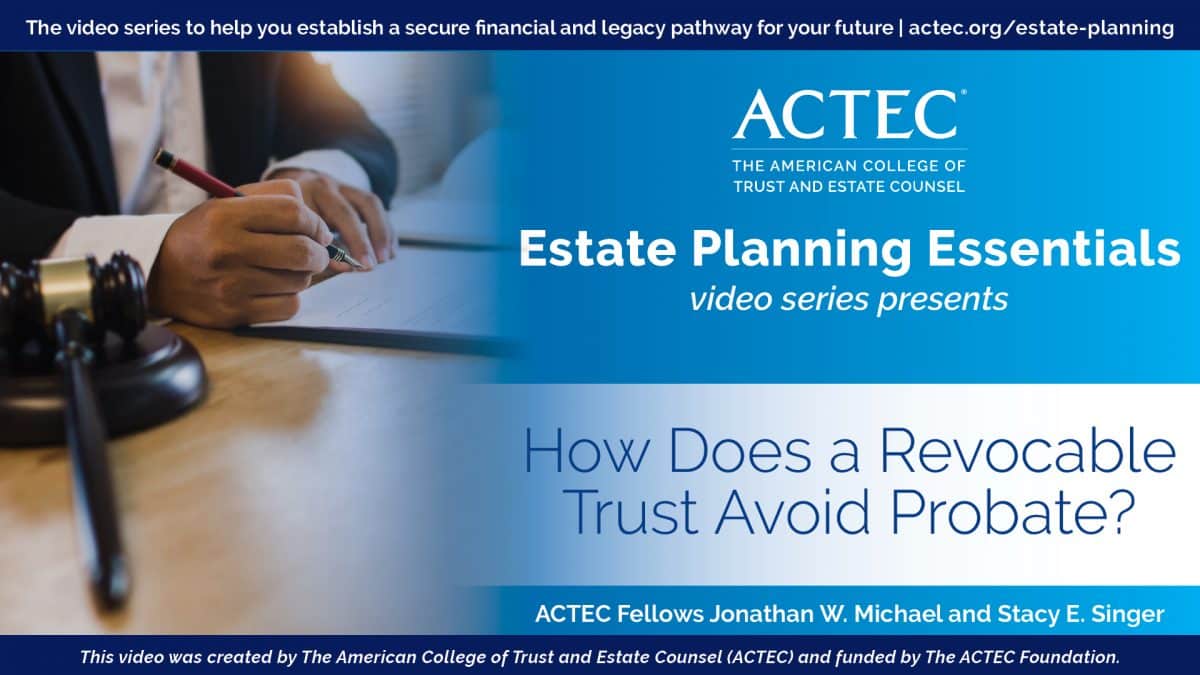Living trusts can have various impacts on taxes, depending on factors like the type of trust, the assets involved, and the tax laws of the state or jurisdiction in which you reside. Revocable living trusts offer the flexibility of altering or revoking the trust during the grantor’s lifetime, whereas irrevocable living trusts cannot be changed or revoked once established.
ACTEC Fellows Natalie M. Perry and Kristin Yokomoto, estate planning attorneys, discuss the tax implications of setting up and funding a living trust and what individuals need to understand when consulting with a tax advisor.
Resources
Transcript
Hello, I’m Natalie Perry, ACTEC Fellow from Chicago, Illinois. I’m here today with Kristin Yokomoto, ACTEC Fellow from Orange County, California.
We’re going to talk about a living trust and the impact that creating a living trust can have on your income tax filings. Taxes are always on people’s minds almost all year these days, so we thought this would be a good refresher.
Purpose of a Living Trust
Kristin, why don’t you start by telling us a little bit about using a living trust and the purposes of doing one?
Kristin Yokomoto: Thank you for talking with me today, Natalie. So when we’re creating a Revocable Living Trust, generally speaking, we’re looking at three different aspects.
So, one, the creator of the trust will be able to say to whom they want their assets to go to and in what manner. And that could be very, very important, especially if we have special needs or some other purpose where we really want to make sure the assets are going to go in the right manner.
Also for confidentiality. So if we don’t have a revocable living trust, California and other states are probate states. And so that means that your assets will be distributed by law and the process in which that happens is through the probate court. And when you file this with probate court, all of your assets, all of your beneficiaries, your family history, it’s all going to be public record, as well as probate in California is taking about two years right now.
So I think from the standpoint of having our wishes, as well as confidentiality and efficiency, those are some of the reasons why we would want to really create a Revocable Living Trust.
Funding a Trust’s Impact on Taxes
Natalie Perry: Okay, great. Yeah, probate in Illinois is taking quite a while these days as well.
Tell us there, you know, educate everyone kind of on the impact of once you push your assets into a trust, how does that change your tax filing or your tax reporting and what kind of things do people need to look out for once they’ve done that?
Kristin Yokomoto: Well, you brought up a great point of retitling assets into the trust. So after we do create the trust, we have to make sure our assets are funded into the trust.
So that means, a grant deed or a quick claim deed to put the house into the trust. That means going to the bank accounts and just to make sure our bank accounts are retitled, any investment accounts, interests in businesses. We want to make sure that we submit the proper paperwork so that now those assets are held by the Revocable Living Trust. And when I say that, I mean by the trustee.
So Natalie, if you were to create your trust and if you were the trustee, then these assets would be retitled as “Natalie Perry as Trustee of the Natalie Perry Living Trust” or revocable trust.
So once we have that retitled, your other question, which is a great question, is so now what’s the impact on our tax return and from a standpoint of income losses as well as which return do we use? And when we do a Revocable Living Trust because it’s revocable and at any time we can change it, we can void it, all of these assets, even though they’re titled in the name of the trustee, they’re still going to be under your social security number. So it will always be reported on the creator’s social security number and still on the 1040 tax return.
How Will 1099s and Documents Change After Funding the Trust
Natalie Perry: So when the client gets their 1099s or gets their bank statements after they’ve funded the trust, will everything look the same or will there be any differences for the client so they know what to look out for?
Kristin Yokomoto: With respect to the 1099, the 1099 no longer will be issued to Natalie Perry, but it will be issued to “Natalie Perry as Trustee of the Natalie Perry Revocable (or Living) Trust.” So, the issuance of the 1099 will be different, but the reporting of it will still go on your 1040 tax return.
Can Incapacity Impact a Trust
Natalie Perry: Okay, so that’s helpful to know. So tell everyone when does it eventually change and the trust becomes its own taxpayer and there may be some other steps that have to be taken.
Kristin Yokomoto: Upon the incapacity, so if you were to become incapacitated, your trustee will make a determination if a new EIN- a separate EIN- should be attained at that time. And it would be a brand new taxpayer ID number, would not be your social security number, and any income and loss related to your trust assets would then go on to a 1041 Fiduciary Tax Return.
Again, whether or not the trustee wants to obtain an EIN upon incapacity will be case by case and different circumstances. But the instance upon if a person were to pass away, then an EIN will always be attained either by the estate or the trustee to report any income, any gain or loss now on that same Fiduciary Tax Return, or 1041.
Natalie Perry: Okay, well, that’s really helpful. So it’s helpful for everybody to know that during a lifetime, there really isn’t a change to your income tax reporting if you create a living trust. I think that’s very useful.
Thank you, Kristen, for being here today and teaching us more about the tax impact or lack thereof of creating a living trust.
Kristin Yokomoto: Thank you, Natalie.
Featured Video
How Does a Revocable Trust Avoid Probate?
Learn how a revocable trust can help avoid probate and maintain privacy for assets properly planned and transferred into a trust during a grantor's lifetime.
ACTEC Estate Planning Essentials

ACTEC Fellows provide answers to frequently asked trust and estate planning questions in this video series.



